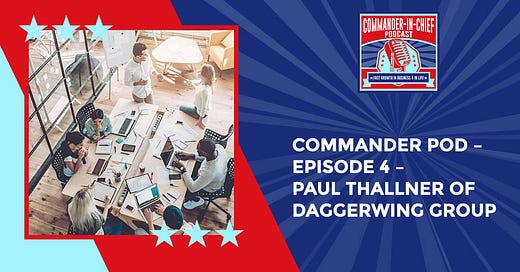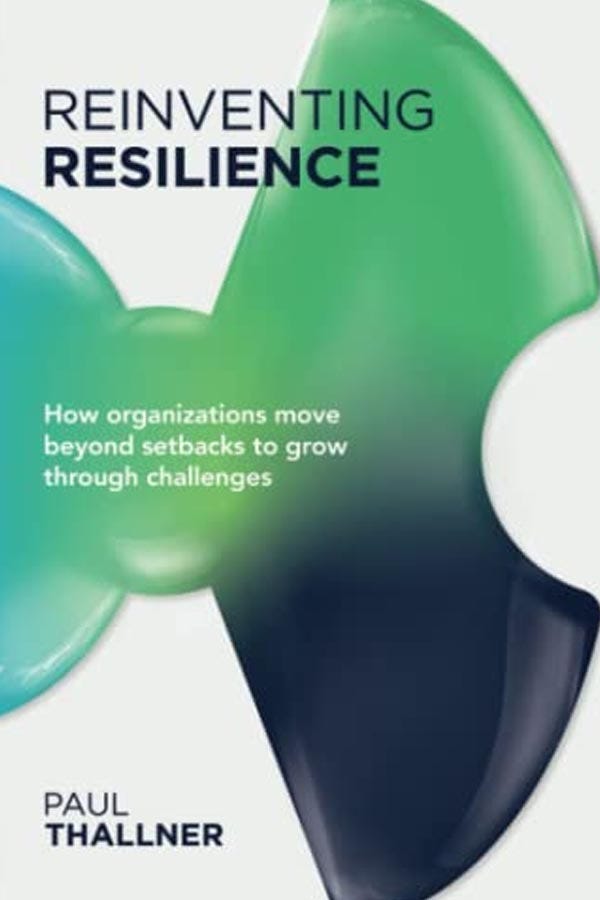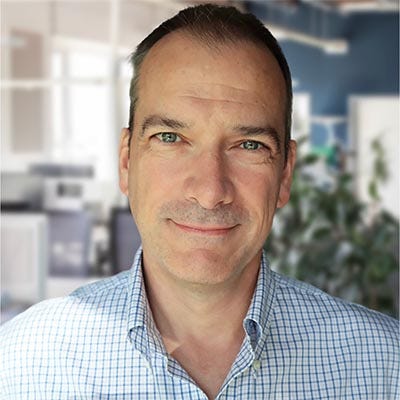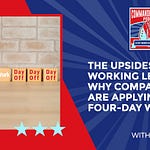Just as important as the technical and procedural aspects in creating organizational change is the people side. They are the core of how organizations can move forward. After all, an organization is just as resilient as its people. In this episode, Paul Thallner, Principal at Daggerwing Group, joins Yuri Kruman to discuss his long-time work on the People side of change management. He shares his remarkable story of going from an English major to non-profits, education policy, change management consulting, and, now, writing books. They also dive deep into the excellent lessons from Paul’s latest, Reinventing Resilience, and how he has implemented them as a consultant for some of the best organizations in the world.
Our conversation touched upon many interesting topics, including:
Why the people side of organizations is important for change
The value Paul got from being an English major
How Paul pivoted to organizational change work
What is resilience
The difference between resilience and resourcefulness
How to create a resilient organization
Self-belief as a way forward
COMMANDER POD - Episode 4 - Paul Thallner Of Daggerwing Group
In this episode, I am very excited to speak to someone who is not a tech startup CEO. He’s not someone who has built twenty ventures and dabbled in organizational development and people management, but someone whose central life work revolves around this subject. I'm thrilled to welcome Paul Thallner to the show. He is the Principal at Daggerwing Group, which is quite well-known in the industry. He's also the author of a book called Reinventing Resilience. Paul, welcome. Please tell us a bit more about your work. This is scratching the surface.
I'm a Principal at Daggerwing Group, which is a global change management consultancy where we work hard on the people side of change, which is the hardest side of change for organizations most of the time. It's very common for folks to understand and work on the technical aspects or procedure aspects of change but what those things succeed when you also work on the people side of change too. That's what I'm fortunate enough to do every day at Daggerwing Group. It's a phenomenal experience and great clients. There are unbelievably smart people on the team that I get to work with every day. It's wonderful.
I got into this work because I had a lifelong curiosity about why organizations and why people behave the way they do. Way back at the beginning of my professional career, I started working for my fraternity. I don't know if you have a big international audience, but a fraternity is a club that exists at a university. It's a social club.
A lot of these are franchised where there's a central office and lots of different clubs around the country. My job was to go around to each of the different universities and find these gentlemen who were in this organization and teach them that there's more to this organization than simply partying. There are values involved and there are standards of conduct, standards of behavior and ways of being that are important for one's own development. Doesn't that sound familiar? That's what we try to do a lot of times in our organization.
That initial curiosity led to a long career in a number of different permutations where I have been working to understand and advance group change efforts at scale for a very long time. Some of that's been in government, the private sector, and nonprofits, but the thread is around how we get large organizations to see what matters and move in that direction together.
You have given us a bit about your origin story, but I have to go back to looking at your LinkedIn, English Lit major. Not only an English Lit major, a Master's in English Lit. It's not the most obvious starting point for people that go into organizational development. How did that come to bear?
The value that I got out of majoring in English Literature was around understanding the storytelling aspect of complex things. There are characters involved in novels, but there's also the underlying story arc that is present in any poem, in any novel, and any short story. I love tapping into those narratives because they are so important to an author's history, a community's history, and maybe to even a country's history. They seem to be these touchpoints that everybody refers back to help ground them in where they are now and where they want to go.
A lot of times, when I'm talking to executive teams and organizations, we do refer back to some of their past history, their stories. Where did they succeed in the past or what story are you telling yourself now that is limiting the executive team from functioning in the way that it needs to? The discipline around storytelling has been important for me throughout my entire career.
It makes great sense. It's interesting that we touched on the subject. I was doing an episode with another author, and we were talking about this exactly. Why is it that most people, let's say, never write a book? Aside from that question, which is not for here, why are people often afraid to tell their stories? It is the same general premise because it's not original enough, or it's not popular enough. They are afraid to somehow come across as boring or some secrets come out.
One of the things we do in this field is inevitably to empower people to tell their stories and to understand that it's not about being original. It's about retelling the same stories with the same themes in a new context and new generation. It's not at all about originality. It's about thinking about someone not above you and what they are going to think, but thinking about the people you are managing or people 2 or 3 steps behind you because your responsibility is to empower them to tell their story. It is interesting that we are touching upon this.
The one thing that's great about framing it in the context of storytelling is that everybody brings their own story to an organization. What's amazing about organizations is they can bring all those stories together to create an organizational-level narrative that everybody can identify with and become part of. You don't necessarily have to leave your identity at the door and become someone else the minute you join an organization.
You can bring yourself to an organization and make your story part of the story of the organization. When companies do that, great things happen and be awesome if everybody felt that way. I know that a lot of people don't always feel that way at work, which is a big challenge. It's something I'm trying to solve.
We are all attacking this problem from a particular angle. I'm digging a little bit further into your own story. At some point between getting your Master's in English Lit, you decided to head toward organizational development. How did that spark appear? I'm sincerely curious.
This is a bit of an embarrassing story. My career started in the education reform space. After getting a Master's degree, it's not easy to find a job doing English Lit unless you are a professor. I went into the nonprofit world and went into the education reform space. I did some education policy work. I did some work trying to start up networks of charter schools, which are publicly funded private schools.
One of the benefits of being in that field for a little while is that I ascended to the Executive Director role of a nonprofit organization that served a group of about 3,000 low-income students in the city of Upstate New York. The problem was that I got into that job because of my technical expertise, not because of my leadership experience. When I ended up taking over from the founding president who had a very big reputation, I was failing.
I didn't know how to keep the team and the organization together. I didn't know how to lead effectively, and it was a real problem. I tried to consult with friends and family members about what to do and how to solve this problem, and it was a conversation with my sister who's a doctor that has studied emotional intelligence, which that's a whole interesting story too.
I was thinking about getting an MBA at the time, which is what a lot of people do at that stage of life, but she said, “Why don't you look into this program? It's at Case Western Reserve University. It's called a Master's in Positive Organizational Development.” I was like, “Tell me more about it.” “It's about the psychology of groups. It's about how to be a great executive coach or coach leader. It's about how to create sustainable organizations and sustainable systems.”
I'm like, “It sounds a little fluffy. It sounds a little weird. I don't know. Is this my thing?” The thing besides my sister's encouragement that convinced me was that the program is run out of the business school at Case with the Weatherhead School of Management. I signed up. I did the program. It was a completely life-changing experience. Not only did it help me become a better and more effective leader of teams and organizations, but it changed my mindset about what I was supposed to be as a leader.
We all take on this. We wear this cloak that we think we are given. It's like, “I need to be this way. I need to be that way. All of this, I should be,” as opposed to, “Who do you need to be? Who do you want to be?” Instead, I was able to define for myself who I needed and wanted to be as a leader as opposed to letting whatever the circumstances or society, my own weird notions define what my leadership was going to be. That was an incredibly valuable experience. It caused me to pivot a little bit in my career and take and go all in on organizational change work.
Thank you for sharing your story. Not every person is going to give the low side of things. I appreciate you sharing. For a bit of context, I mentioned this before we started. My own experience with getting into this HR, OD, or LD world is very much something between through the back door, something about being almost not anti-academic because I did my academic and did my time there.
It’s seeing something I have been exploring a lot more. I don't have a formal diagnosis, so I have never been officially called ADHD. Most likely that's the case. It fits the profile. The other part is this whole thing about being a highly sensitive person. There's neurodiversity. Now that the more about it, I'm pretty sure my mom is that way. It’s always has been.
I'm pretty sure my father was as well. I'm learning more about my father. For me, all of these things are coming together, and it's starting to click a little bit more belatedly, “Why did I get into this field? What am I doing here as this weird thing in my sixth career? How does this make any sense?” It's not a calling card. It's this thing that I have exuded wherever I have been in a corporate sense. I see pretty quickly right through all the corporate garbage and see exactly what is happening there and all the forces. If my career history in the corporate context shows well, people are not happy with this. They don't like when someone sees right through their BS.
One of the reasons why I got into this space is not because HR is not as advanced in some regard. Technologically not in terms of maybe having the latest practices. It doesn't have much power budget and all of these not great dynamics. It's also ripe not just for disruption, but it's ripe for creating a tremendous positive impact through it seeing it as a prison. One of the reasons why I'm here, and it seems like for yourself as well, is because you are also coming from a very different angle. Part of it is because we see things from a different perspective. We bring a very different set of intelligence to these kinds of problems.
The most important thing is we also come in as consultants. I don't want to minimize the impact of that. Coming in as a consultant versus being in-house as an HR person is vastly different because you already have the buy-in from management. They brought you in. They are paying you probably twice as much for half the time, and you are going to deliver five times the impact.
It's interesting to see those forces come together. Now it’s a very exciting time in this space because of AI, but also, there's an influx of talent. There's an influx of very different perspectives from other areas of business. This conversation is very operable. Let's orient this discussion a little bit more toward organizations during COVID and now after it with a certain different awareness where there's loneliness and alienation. There's very low morale. There are layoffs.
You have all kinds of very negative forces that impact not just morale but resilience. Head in that direction because that's a big subject for you in your writing. Let's dive a little bit further into this subject. What is resilience? You have a great group hanging out in Wharton. You have Katy Milkman and Angela Duckworth, I believe. There's Adam Grant there as well. That's beautiful. That's great. I don't know if grit is the same as resilience, but I would love to start there. How do you define resilience, and how do we get our hands on it? How do we measure it, and then what do we do with it?
During my research for the book, I did a thought experiment where I asked a bunch of people. I said, “Here's a sponge, and here's a steel rod. Squeeze the sponge and let go. What happens? It returns to its un-squished state. Take the steel rod and try and bend it. What happens? It resists the bending pressure. Which one is resilient?” The answer is both because there are so many different ways to interpret this idea of resilience.
What I came up with in studying resilience was this going back to my training in positive organizational development, which is all about positive psychology and strengths-based approaches to change. It is this idea that we are thinking about resilience in a deficit-based way. This idea is that it's all about setbacks and then recovering from a setback.
What happens when you recover from a setback is you end up where you started. What we don't talk about usually is this idea of growth and learning as a result of experiencing some challenges. That short changes the whole conversation. It keeps us out of growth mode and in a deficit-based framework where all we are doing is trying to fix problems all the time, which is a zero-sum game.
If we can reinvent the idea of resilience, we come up with a new definition, which I have. This is not necessarily entirely original. This is based on the work of many people, but I have defined it as the courage and confidence to grow through challenges as opposed to simply surviving challenges. That comes from the study of what makes individuals resilient, and this hypothesis I had that if the same things that make individuals resilient scale up, could we apply this model to an organizational level so that we can create resilient organizations instead of organizations full of resilient people?
If we added a bunch of resilient people to an organization, the logic would be in order to make a resilient organization, you'd add more resilient people. That linearly does not make sense because human nature doesn't work that way. We have to change the conditions inside an organization to help people not need to bounce back so often because there are all kinds of data around workplace stress, which is a huge problem.
This is something I'm personally passionate about. It's why I wrote the book. It's a global epidemic. As you may know, the World Health Organization declared workplace stress a global epidemic many years ago, and it's a problem that's been persistent for a long period of time, even before COVID. Certainly, since then, it has escalated a lot. We need resilient organizations to not keep people around, but to keep people healthy, extend their life even longer, make them happier, and make the effects of working at an organization positive not just for the company but for the people those folks interact with, like their families and communities.
Let's zoom out for a minute. Not to sound overly cynical, but we are all brewing in the same soup. We have to face a lot of very cynical folks. We hear mindfulness. It means like, “Be aware and produce more.” How do you battle the perception that, “Grit and resilience, do you want me to be in a better state so I can produce more?”
People go to work. It's believing that they are there to do a good job. Generally, people choose to go to work and are trying to perform well. When it gets challenging is when an organization tries to extract additional performance where there isn't any to be gained. That's where people start resisting these efforts to change.
The logic is let's tap into some unseen reserves of resilience in order to raise awareness that people do have more resources at their disposal or more time and energy. That's an approach. It's probably good but not sufficient. It's okay to give people some resilience, mindfulness, and well-being training to help their own ability to cope with very challenging circumstances, which these have been, but it's not sufficient. What we need to do is, as organizations, not offload the responsibility of well-being to the individual, all of it. Everybody's responsible for their own well-being.
The company is also responsible for creating conditions that make it easier to work there or make it easier to do your job, easier to get results, easier to collaborate with colleagues, or easier to get a lay of the land and understand the landscape so that you are not doing work 2 and 3 times, or having enough people and resources around to get the job done so you are not working eighteen hours a day.
Everybody is responsible for their own wellbeing, but the company is also responsible for creating conditions that make it easier to work there or make it easier to do your job.
Those are the responsibilities of an organization that support the idea of mindfulness as opposed to working against it. What happens is when an organization does nothing except encourage individuals to work on their own stuff, they run the risk of creating a rift because if the organization's not doing anything and everybody else is expected to do things that help themselves, that is seen as inauthentic and not terribly helpful. It's both ends. That's where we can overcome some of this cynicism, that it's a forced compliance exercise or productivity enhancer. If people are using it for that purpose, that's not its intention. I don't think it's a good idea from a business perspective. That ultimately will bite organizations down the road sometime.
Maybe I'm picking a needle from a haystack or separating resourcefulness from resilience. A lot of organizations scream it out. What they mean is to be more resourceful and do more with less. Now it's layoffs. It's a very important distinction to me to not see resilience as, “Be more resourceful. We figure it out. You are smart. That's why we hired you.” It is not going to work with Gen Zs, at least.
The reality is people are pretty resourceful. The fact that anyone who's been in the workplace for any period of time has seen so much change in the way they do their work, it would be impossible to make a case that people are not resourceful. It is simply not true. What organizations can do is be candid, honest, and transparent about the realities of the organization.
What's the context that the company is living in? It is being honest like, “We expect you to do this work in this particular way now.” We also know that in 2 or 3 years, we may be doing it a completely different way. We are going to have to adapt and change and things like that. Maybe that's going to be frustrating for you, or maybe that's going to be challenging for folks, but that is how the world is working now. Saying that to people out loud and being honest about the reality of the situation, which is one of the core pieces of my resilience model is important. Organizations that do that put themselves in a good position to weather future challenges a little bit better than ones that don't.
I have two questions that came up. Number one is looking at your background. It's pretty apparent to me that you have worked with a lot of relatively more progressive organizations. They are already coming up perhaps with organizational mindfulness that they have to treat their people well. They have to give them room to grow.
One that is worth mentioning is you worked for an organization that a lot of readers will know great places to work, which, by itself, clearly has to be internally consistent if it's measuring other organizations and it has to do things the right way. Why am I bringing this up? It's beautiful. It's a great thing. It's worth noting that we are talking about this split between calling resilience by its code word resourcefulness, meaning some workplaces are a factory or a sweatshop, choose your analogy.
Some are naturally started by founders that have that additional awareness and want to do things perhaps because they were hazed back in whatever workplace. It's very important to bring that out because something like your framework, my framework, or the framework of anybody doing this work is a lot easier to implement in a company with that, not just awareness, but the infrastructure to implement and the willingness to stick with it to the end.
We will come back to that after this next question. I want to set the scene that we have two very different tracks. One of the most important things for me is in your actual work when you go into organizations, how do you take a company full of resilient people and make a resilient team and then a department company? For me, that's super interesting because that's not something that I hear too often. What's the magic?
The magic is in the hard work and the desire to do it. That's a necessary precondition for anything to work. My model isn't prescriptive that it's a how-to guide to be resilient. It is a framework to have an honest and open conversation about what it's going to take to create an organization that is prepared for the unknown.
We know that whatever is coming down the road in the future is going to be difficult. It's going to be challenging. Instead of waiting for that moment to happen and then scrambling to figure out what to do, let's prepare in advance to assume and expect that there will be significant challenges. Some of them we know every quarter, every year, or every earnings call. All of these things are known. If you are old enough to remember Donald Rumsfeld’s known knowns, then there are unknown unknowns. No one could predict a pandemic. Some people are predicting a recession that may happen. Supply chain issues are still ongoing for a lot of folks. There are a lot of things happening that are causing us to adapt and evolve a lot over time.
When I talk about creating a resilient organization, there are a couple of things that the organizations can practice and work on very explicitly. One is taking a good hard look at whether they believe they can win. It is understanding the team or the organization's ability or self-belief. Do we collectively believe we can win, or are we going down the Blockbuster route or the Bed Bath route where it's like, “We have this thing. We are trying to keep it going, but we know eventually we are going to be a dinosaur.”
What's the self-belief on the team? The other is how honest the team is about the reality of the situation that it's in. A lot of executive teams or even senior leadership teams or other leaders in organizations tend to respond to challenges in 1 of 2 ways. They either bury their head in the sand and pretend it doesn't exist, or they panic, freak out, and take drastic immediate measures.
Sometimes that's cost-cutting, layoffs, or dropping a product. There are lots of extreme responses in organizations sometimes. Usually, either one of those reactions is based on a narrative that they think is true or that they want to believe but isn't true. Going back to our original concept of storytelling, if you are honest about what's going on, you can create a story that's true and respond, react, and make business decisions based on that.
It is not based on what you hope it is, what you want it to be, or what you think it could be, but on what it is. If the team has a shared belief about what's true, they can make better decisions. It’s those two things alone. There are lots of other stuff in the model, but those two things, self-belief and collective awareness, are the two core pieces that lead to a resilient organization. When organizations have both of those things, they then have the courage and confidence to grow through challenges.
This is pure gold. I hope you guys are reading it. If you look at sports teams, you often have this postmortem on the latest NBA champion. Look at LeBron James when he won in 2020 against the Warriors. There's always some very strong dynamic wherein there's a regular team dinner. Maybe one member of the team pays each time, something like that.
There's always some very strong factor that continuously reinforces this winning mentality. With that come all sorts of different habits, practices, languages, psychology, and all of these things. There are a lot of sports and military metaphors around what happens in the workplace. Even though many of those are misplaced or are not accurate, in this case, it's right on because it's exactly the same thing. It's looking at how human nature works. Not human nature quantity of one, but how things work in a team.
This is a very important point. It doesn't have to be a hazing. Many of us are always looking for, “I don't fit in this group. How am I going to fit in there? I can't go to the team dinner because it's not kosher.” There's a lot of that type of thing. If you do it very thoughtfully and not in a gimmicky way, it's not like once a quarter exercise if you are offsite, but it is some meaningful ritual that helps people to tell their stories. It helps them to mutually reinforce each other and creates a certain safety in their mind that they are able to share and that people care about them. It's a lot easier to then say, “Let's be more resourceful. Let's do more with less.”
Think about what happens to an individual. One of the examples I remember from grad school was a teacher talking about when you are frozen because of anxiety. He was using golf as a metaphor. If someone says, “Don't hit it into the woods,” what are you going to think about? All you can think about is there's the woods right there, and that's where the ball goes because you have created a vision or a mental model in your head that that's what's going to happen. Lo and behold, it happens. In a lot of ways, the most resilient teams are the ones that do have this straight-down-the-fairway mentality. It's like, “I don't know how far or whether it's going to happen every single time, but I know that we are good enough to do this thing well. My colleagues are around me. I may have a bad day, but people have my back.”

On balance, we are a good team because we all believe that we can do it. That's an important point when it comes to creating resilience because when you have that reserve of hope, optimism, and belief, a little blip on the radar or a little bump in the road isn't going to send you flying off the rails. You are going to be able to absorb it, learn from it, and move on. The challenges become a little bit smaller and easier to handle when you have a strong sense of self-belief and a good understanding of the environment that you are working in.
I want to come back to a previous question. We set up this paradigm where we have the best companies to work for. They are mindful. They are very strong in how they empower people. We then have the dark side of the moon. We have organizations that either don't know how to address this. They may not care. The founders may have been hazed in bad work environments. It might be a frat house. I don't know what.
In that situation, putting more of a coaching hat on rather than consulting, if you are coaching someone who fits the profile of someone mindful, resilient, or someone who wants to empower his or her team in a company that's not great at that, how would you coach them? Maybe you could give us something from your framework or your book. That's a very common scenario.
There are some very large organizations that, on the surface, look like they have an amazing culture across the entire ecosystem or the entire enterprise, but you know that there are parts of the organization that are maybe a little bit less. Nobody's featuring them on Instagram, Fast Company, or any of these because maybe that little corner of the organization isn't that great.
We encounter a lot of organizations that are like that where it's an uneven experience for workers across the enterprise. What we try to do, especially when we are doing culture work or an employee value proposition or even helping develop an operating model for an organization or functional area, we do start with what are some of the things that work. We don't have to create an amazingly glitzy, glamorous culture overnight here that's going to be featured on the front page of Fortune Magazine.
If that's your goal, you can probably make that happen through your PR company, but is that reality? We want to create a reality where everybody has a good experience at work, where they are feeling like they are making a good contribution, are seen and heard, are appreciated, and all that great stuff. It doesn't mean they are singing from the rooftops every day, but it means that they are having a good experience at work and they are able to do their job and focus on what they have to do.

What we try to do is understand what are the ways of working within the organizations that serve that and what are the ways of working in an organization that erodes or doesn't support that. We then try and bring it to the surface and ask people, “Do you want to keep doing it that way? That seems to be creating a lot of stress, tension, low morale, dissension, or resistance.”
If that's how you want your organization to be, keep doing that. That's great. Maybe that works for you. You are still making money. You are still in business. You are a company, and maybe that's fine. If you want to also factor in the people side, which involves creating an experience where they can give you their best every day and maybe even innovate and come up with new ideas and help you accelerate as a business, then maybe we should change some things and experiment. Let's try some things. It doesn't mean you have to be Pollyanna and start putting posters everywhere. How about let's start with a boss caring about the person that they are leading? That's something that can be done easily. How about asking them how they are doing?
Creating that cultural norming of the behavior, I don't think it has to be super progressive. I'm going to say something that sounds mushy and soft, but it can be interpreted in a lot of ways. If you create a culture of compassion or a culture of coaching, that doesn't have to be everybody walking arm in arm down the hallways every day. That can simply be checking in, “How are you doing?”
For five minutes of our one-on-one, we are going to talk about something other than work. I'm going to show you as a boss that I care about you as a person. I'm going to create a better experience for you at work by doing that. There are lots of things that individuals can do on their own to take it upon themselves to create a good work experience for others, and that can ripple throughout an organization. An organization like Daggerwing that comes in and helps with that accelerates and advances that more quickly through structured planning, coordination, and things like that, but people are doing the work. The people who work there are the ones that have to do the work.
There are a couple of takeaways. I want to make sure readers get this. It's phenomenal. A lot of this work is not glamorous. It's not PR worthy. It's slow, thoughtful, and meaningful. Yes, it goes into some very deep and unstructured parts of the human psyche perhaps, but that's not the point. The point is to be human to others. Make sure that they are okay. Forget resilience for a minute. Are you okay? How is life treating you?
Take five minutes and pay attention, put the phone down. It doesn't have to be rocket science. Consultants come in and frameworks and all of this stuff, and then you have the finance and operations people and are like, “Results.” The challenge is don't think of it as, “I have to adopt McKinsey's framework, BCGs, or this or that one.” A lot of it starts in very basic human dynamics. Care enough to ask.
Caring is the ticket to ride. I don't think you could be a modern manager without caring about the people you manage. The mindset of workers has changed to the point where they are not going to tolerate a dictator, taskmaster, or micromanager. They want to know that their boss has their backs and appreciates their work. That's the reality of the situation.
You can’t be a modern manager today without caring about the people you manage.
People can be irritated by that, call it soft or mushy, or bemoan the fact that society's changing. Fine. Do that on your own time because that's the reality now. If you are not going to adapt as an organization to that reality, you may as well start selling off your assets now because there's no way you can survive or attract workers of any significant value without taking that into consideration.
It turns out even in very hazing environments like finance and so on. Thank you for sharing that. I appreciate it. In the last part of the show, we ask every guest for a bit of guidance, more from a personal perspective to refresh. From my work, all about being your own commander-in-chief, there are four conversations. There's one with one's body, with one's mind, with other people, and then with the God of the universe. I would love to hear your guidance on what has worked for you in any or perhaps all four of those conversations.
The thing that I would love to share with your readers is this idea of self-reflection and self-belief as a way forward, especially at the younger end of our career or maybe we are a sole proprietor or maybe leader of a small startup or an organization where there's lots and lots of pressure. What ultimately happens is you start living in this land of should, “I should be this. I should be that because I'm taking on the identity of the founder, CEO, or startup.”
There are all these associations that go along with those things that are put upon you and you feel like you should measure up and play that game or role. A lot of people spend the first 15 or 20 years of their career trying to live up to all of those shoulds. Then they hit 40 and then they try to undo all those shoulds for the rest of their life.
My advice to anyone reading now is to start letting go of some of those shoulds because the only thing you should be is yourself. Figure out who that is and be that. Don't let anyone or any other external force define you. Define yourself and you will be more comfortable far sooner and a lot more happy and more successful in the long run.
This is such amazing advice. I wish more people would stop being martyrs to some idea of themselves that was implanted in their head maybe by their parents, by society, or all of the above. It's the single most liberating moment where you realize that all of it is fiction. From beginning to end, it's a fiction. I wish that even people in my life, people that I coach, and loved ones would let go of these things. Usually, you need someone who's an outsider to provide some anchor, loved ones, nevertheless.
Every now and then, look in the mirror and say, “Who are you?”
Paul, thank you so much for this truly amazing conversation. We went very deep and wide. It’s wonderful to have you. Please tell our readers where they can learn more about your work and your book.
I would love for folks to go to ReinventingResilience.com. We can learn about the book and the model and a little bit more about my story but also sign up for the newsletter. It is not because I want to sell you a course or get you on my mailing list. I want to try and create conversations where people are learning and applying some ideas around creating resilient organizations. In my opinion, we cannot survive much longer when we are creating so much workplace stress. It's not good for us and our society. We as leaders who work in organizations need to take some responsibility for lowering workplace stress. I'd love to strike up conversations with folks about that.
Tell us where this interest can find your newsletter and maybe Daggerwing.
The newsletter is on ReinventingResilience.com. If you are an organization that is in need of some organizational change work like you are experiencing significant growth or significant change or in need of a new operating model, have a new leader or new executive, or trying to redefine your culture for a new age and a new workforce, DaggerwingGroup.com is where I work on the daily. It's a great consulting company. We are different and unique. We work shoulder to shoulder with our clients as opposed to coming in, doing the analysis, dropping off our recommendations, and taking off. We love working with our clients and forming strong relationships with them so we can help them.
That's the consensus in the industry. You guys do something very special there. Paul, thank you very much for coming to the show. I appreciate you. I hope we can continue this conversation another time. Thanks for coming along.
Thanks so much.
Important Links
About Paul Thallner
Paul is a Principal at Daggerwing Group. He has extensive experience working with executive teams to identify and implement strategic change initiatives. He has led major culture integrations, transformations, and workplace analysis projects. Paul began his career mobilizing change at scale in the public education sector and has held leadership positions in non-profit, government, and private-sector organizations. He enjoys learning to play guitar, long-distance cycling, and rescuing dogs (41 so far). He has a wife and son who love travel experiences as much as he does. Paul is also the author of the upcoming book, Reinventing Resilience.
LIKE WHAT YOU HEARD ON THE COMMANDER-IN-CHIEF PODCAST?
Leave a Tip :) [$10 ] / [ $5 ] / [ $1 ]
—
Executive Coaching Office Hours (EXCLUSIVE FOR READERS)
Ask me ANYTHING career- or business-related for free, 1-on-1 (REALLY)
Click the link to schedule a time.
—
Are there any other subjects you want me to cover? Hit “Reply” and tell me!
I love hearing from you guys :)
—
If you enjoyed this newsletter, please forward to a friend (or 5 :) or someone you feel would benefit from reading it!
Yuri Kruman
+1 (347) 415-0265 (Whatsapp)
















Share this post